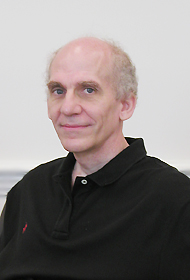Teacher-Scholar Legacies: Clark Thompson
By Ralph Kennedy, Professor of Philosophy
 When I approached Clark about this profile, he assured me that writing it would be easy because there would be so little to say. Since kindergarten, he said, he’d always been either a student or teacher. But he is not so easily summed up.
When I approached Clark about this profile, he assured me that writing it would be easy because there would be so little to say. Since kindergarten, he said, he’d always been either a student or teacher. But he is not so easily summed up.
How did he discover his love of philosophy? By first discovering that at the University of Virginia he could avoid all exams by gaining admittance to the honors program, during which he was able to devote his junior and senior years entirely to philosophy courses, none of which required exams, only papers.
Clark has a J.D. and a Ph.D. Why then did he not settle for becoming an attorney, choosing instead the life of an academic philosopher? Clark’s response is to ask who could pass up the chance to ponder such questions as “Where am I, or what? From what causes do I derive my existence, and to what condition shall I return? Whose favour shall I court, and whose anger must I dread? What beings surround me? And on whom have I any influence, or who has any influence on me?” (Hume, Treatise 1.4.7.8) Hume’s questions were more riveting than anything he thought he’d encounter in the life of an attorney. (Clark has a way of answering questions by quoting Hume.)
Clark is “bookish.” Has he ever sold a book? Is he a book collector? Perhaps, but what one knows for sure is that a visit to his office will make evident a consuming love of books.
Clark has taught many generations of Wake Forest students, many of whom must not have known initially quite what to make of the ironical cast of his sense of humor. But eventually they “get” him and benefit from his guidance through the thickets of philosophy that he knows so well.
His colleagues have also benefited from Clark, whose knowledge of the early modern philosophers is especially deep and who speaks with authority on philosophy of law, philosophy of war, Hume, Rousseau, Mill, and many others.
He will be missed.
“Clark has taught many generations of Wake Forest students, many of whom must not have known initially quite what to make of the ironical cast of his sense of humor. But eventually they ‘get’ him and benefit from his guidance through the thickets of philosophy that he knows so well.”
Ralph Kennedy, Professor of Philosophy

